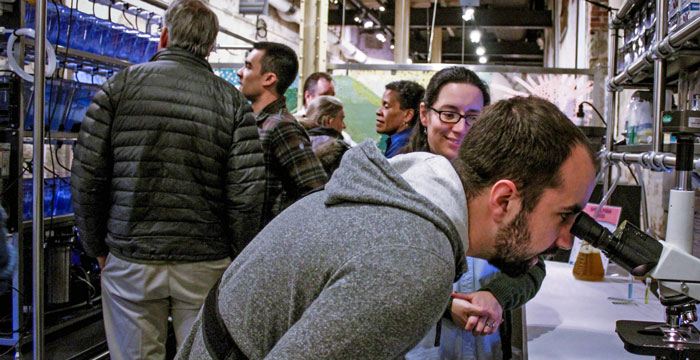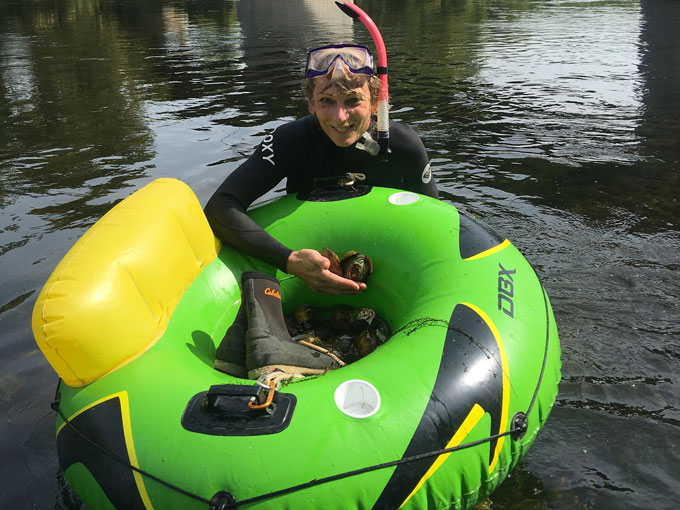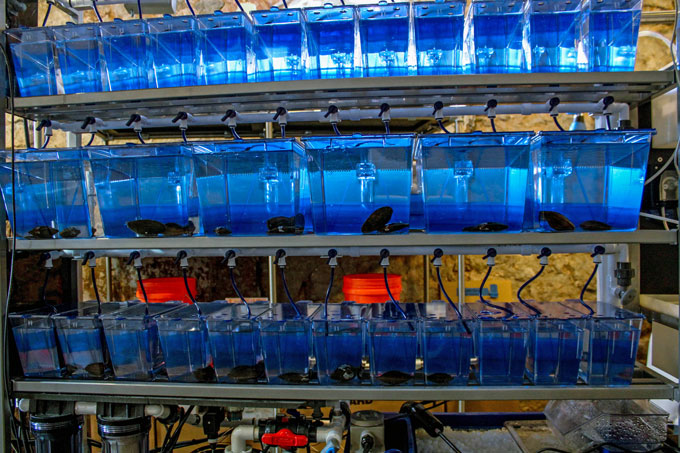
WTFriday: Here’s Why PA Just Spent $8 Million on Mussels
On April 19, Pennsylvania Governor Tom Wolf and the Pennsylvania Infrastructure Investment Authority (PENNVEST) announced a $39 million investment in water infrastructure projects spanning nine of the state’s 67 counties.
For the most part, the projects were the type of investments you might expect to see: $2.1 million for water main replacement in Chester County; nearly $300,000 for a Jefferson County water storage tank; and, in Westmoreland County, $2.05 million for stormwater sewers.
However, one item on the list of a dozen water investment projects stood out, both for its size—just under $8 million—and its curious nature.
Second only to a $9.5 million loan distributed to Delaware County, the $7,934,000 awarded for Philadelphia County represents a massive investment in the future of a very unusual type of “infrastructure”—freshwater mussel beds.
http://i.imgur.com/YyigHgD.gif
Yes, mussels: the often unnoticed, clam-like creatures who call our local waterways home and, during every moment of their adult lives, faithfully conduct the rarely heralded but important work of filtering out sediment and pollutants while simultaneously stabilizing flood-scoured river and stream bottoms.
In their announcement, PENNVEST outlines how the Partnership for the Delaware Estuary—a close partner with the Philadelphia Water Department—will use the $7.9 million to “construct a freshwater mussel hatchery that will produce hundreds of thousands of mussels annually” with the goal of restoring mussel beds in the Susquehanna and Delaware watersheds.
“These mussels will, in turn, contribute to the improvement of water quality in both the Chesapeake Bay and the Delaware Estuary by filtering out nutrients, particularly nitrogen, that run off the land,” PENNVEST wrote.
This bold investment comes on the heels of growing interest in these native and often imperiled bivalves spurred by the February 2017 opening of a small-scale educational freshwater mussel hatchery at the Fairmount Water Works.
The opening weekend of the exhibition saw record-breaking numbers, with over 600 visitors. People from across the region were met with an interactive showcase detailing the lifecycle of mussels and the invaluable contributions they make. Videos, digital animations, and a working science laboratory all help the public to see mussels as more than motionless, rock-like bottom-dwellers.
Completed in partnership with the Water Works, PWD, the Pew Center for Arts and Heritage, The Academy of Natural Sciences of Drexel University and the Partnership for the Delaware Estuary (PDE) with additional funding from the McLean Contributionship and Pa. Department of Conservation and Natural Resources, the hatchery highlights how restored freshwater mussel populations could act as a sort of innovative, living “infrastructure” with powerful benefits for Philadelphia and Pennsylvania’s waters.
Now, with the help of the PENNVEST’s generous investment, PDE will be able to construct a commercial hatchery to restore the once-abundant mussel population throughout the Delaware and Susquehanna river basins.
“We’re thrilled to be able to have the initial funding that we need to service the upper mid-Atlantic region,” said PDE’s Dr. Danielle Kreeger. “Investing in freshwater mussel beds for cleaner water is a new and innovative concept that, frankly, has been difficult to fund, and we applaud PENNVEST for taking the time to understand and support this vision.”

A nationally recognized freshwater mussel expert and champion, Kreeger has spent more than 20 years working with PDE, The Academy of Natural Sciences of Drexel University, and other researchers to study local species and develop the Water Works exhibit.
The production hatchery, which will be a part of the “Mussels for Clean Water Initiative,” is currently in the early stages of planning. Initial ideas consist of a multi-use facility located along the Schuylkill River Trail at Bartram’s Garden in Southwest Philadelphia. The hatchery section of the building would be funded through the PENNVEST investment, but PDE hopes to work with PWD and Bartram’s to create an expanded facility supporting diverse outreach programming, including possible features such as a teaching lab, media center and public exhibits.
Using ponds at Chester County’s Longwood Gardens and the Winterthur Museum, Garden and Library, located near the Delaware-Pa. state line, Kreeger and PDE are currently screening sites in search of ideal conditions for juvenile mussel nurseries. Baby mussels from the new hatchery will reside in such nurseries while they grow. Once they are mature, about half will be used to restore natural beds in rivers and streams, while the other half will be used in specific projects to improve water quality.
The hatchery—anticipated to produce up to 1 million baby mussels a year—will be the first of its kind in the region.
Kreeger says that the few mussel hatcheries that do exist focus mainly on restoring rare and threatened species. Because healthy mussel beds function like water treatment plants, this new initiative will instead focus on rebuilding mussel beds to restore natural infrastructure that promotes cleaner water, thereby benefitting the regional economy greatly.
A single adult mussel can filter up to 20 gallons of water a day, resulting in an immense water quality impact when there are millions of mussels living on a river or stream bottom. Studies by Kreeger and her colleagues have shown that an acre of healthy mussel bed in the Delaware River filters more than 10 tons of polluting particles per year.
Along with many other issues related to development and habitat loss, declining native mussel populations in America’s waterways have led to poorer water quality and steep treatment plant filtration costs. To remove suspended particles of mud, sand, silt and other solids from water—work once done by large colonies of mussels—water treatment plants force raw river water through complex filtering systems.
By using mussels as natural infrastructure, Kreeger says water treatment plants can achieve raw water that enters the treatment process cleaner and requires less mechanical filtration, which she believes should help reduce water production costs substantially.
While the importance of these freshwater bivalves is often overlooked, PDE sees this multi-million-dollar investment from Pennsylvania as a positive sign that nature-based solutions are being embraced as viable tools in the future of water treatment. Of course, natural infrastructure such as mussel beds, oyster reefs, wetlands and forests provide many other benefits to the ecosystem and people too.
Those eager to see a full-scale production hatchery for freshwater mussels along the Schuylkill will have to wait, but the good news is that the public can experience the fascinating world of these aquatic creatures right now at the Fairmount Water Works.
Located on the Schuylkill right beside the Philadelphia Museum of Art, the historic building and educational center is open from 10 a.m. to 5 p.m. Tuesday-Saturday and from 1-5 p.m. on Sunday.
Free general admission is available to the public (donations appreciated) and Philadelphia School District student groups. Free two-hour parking is available along Water Works Drive.
To learn more about the remarkable lives of mussels and the contributions they make, stop by or visit their website.










